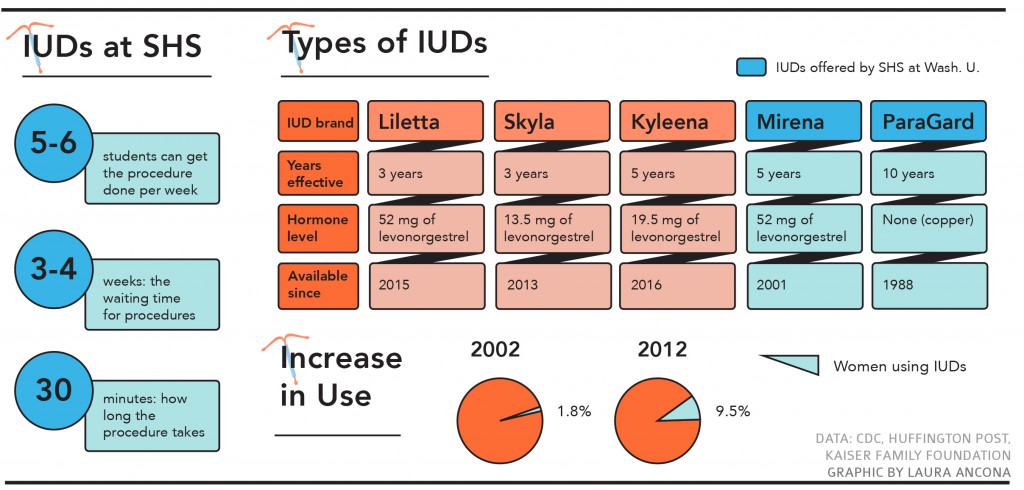News
Contraception access expanding
SHS works to accommodate increasing popularity of IUD procedures
Due to the increasing demand for intrauterine devices on college campuses, Student Health Services has been working to accommodate the service’s newfound popularity despite having only one doctor able to perform the insertions.
With more long-acting reversible contraceptives (LARCs) coming to market, some believe that IUDs may be the next big thing for college women. Currently, Student Health Services (SHS) offers two different IUDs—Mirena and Paraguard. Furthermore, with implementation having its obstacles, the birth control pill is still a more popular form of contraceptive at the moment.
 Laura Ancona | Student Life
Laura Ancona | Student Life “I would say that our most popular still, by far, is birth control pills and most likely, the next one is going to be in the form of IUDs. After that we look at the vaginal ring and the patch and some other forms of birth control, but it’s becoming pretty popular,” Cheri LeBlanc, director of student health and wellness, said.
In 2015, with the approval of Lilleta, the Centers for Disease Control and Prevention estimated that about 7.2 percent of women of reproductive age have opted to use IUDs or other forms of LARCs, a significant jump from just 1.5 percent in 2002.
That popularity on campus is in part due to the convenience of receiving the procedure on campus. However, scheduling difficulty has arisen at SHS since only one doctor—Jennifer Hillman—is able to perform the insertion and only two types are offered. Adding to the difficulty is the fact that, compared to other birth control appointments, IUD insertions procedures require multiple visits and longer appointment times—limiting the number of procedures to five or six a week.
LeBlanc said that SHS works to be as flexible as possible and the benefits of having a highly skilled person do the procedure outweigh drawbacks.
Junior Elizabeth Levinson, a co-president of Washington University Student Advocates for Reproductive Rights, had an IUD inserted by Hillman just last week. She was compelled by recommendations from friends, amongst other reasons.
“I know in my group a fair amount of us have [IUDs] actually, which is one of the reasons why I chose to get it,” Levinson said. “Other than the fact that I am one hundred percent not responsible enough to take daily medication. It definitely helped that the majority of my friends on birth control had IUDs and highly recommended it to me.”
Another student, who had an IUD inserted at SHS but wished to remain anonymous, noted the major side effects that often accompany oral contraceptives and the difficulty in maintaining the fixed schedule required deterred her from using the pill. Although at first she was apprehensive about the IUD procedure, careful research using sources such as Bedsider and Planned Parenthood led her to favor the procedure, and she said she doesn’t regret the choice.
“I just kept telling myself that the pros of the IUD far outweigh the cons, both statistically and for me personally. In the end, they really did,” she said.
Despite SHS’s accommodations and the overall ease of the procedure, Levinson did face some difficulties in scheduling her procedure.
“She really only had time from like 10 to 3 and that’s right when I have all of my classes so I ended up having to make an appointment on my lunch hour in between two classes which wasn’t the best idea because I actually had a lot of pain with mine afterwards,” Levinson said. “So I did end up having to miss class, so the scheduling part was a little bit difficult.”
Additionally, both Levinson and LeBlanc noted a difficulty in guaranteeing insurance coverage for the procedure. According to LeBlanc, Wash. U.’s student insurance covers both the hormonal and non-hormonal forms of IUDs through the Affordable Care Act. When students have other forms of health insurance, however, the student and SHS must take additional steps to be sure that the procedure will still be covered.
For Levinson, a native of Oklahoma—which has rejected provisions of the Affordable Care Act—and her high deductible, determining coverage for her procedure was complicated. She received assistance from SHS and was able to figure out the cost of the procedure and her insurance company’s policy.
Both Levinson and the anonymous student felt generally positive about their experiences. Levinson noted that while the procedure itself is quite uncomfortable, the doctors at SHS made it as pleasant as possible and made sure that she knew exactly how the procedure was going to be handled. The anonymous student had a similar experience, adding that her boyfriend was allowed in with her during the procedure.
“I thought it was great that SHS was so relaxed about having a friend or significant other come to keep you company and make you feel more comfortable,” she said. “While I definitely felt it, and I would never call the procedure pleasant, I had a very positive experience.”
According to LeBlanc, SHS hopes to grow its providing of care in conjunction with the increased popularity of the procedure, although they want to maintain the current level of skill.
“Certainly with how much more popular this method of contraception is, we’re looking into expanding the number of providers who could offer IUD insertion at SHS,” she said.
